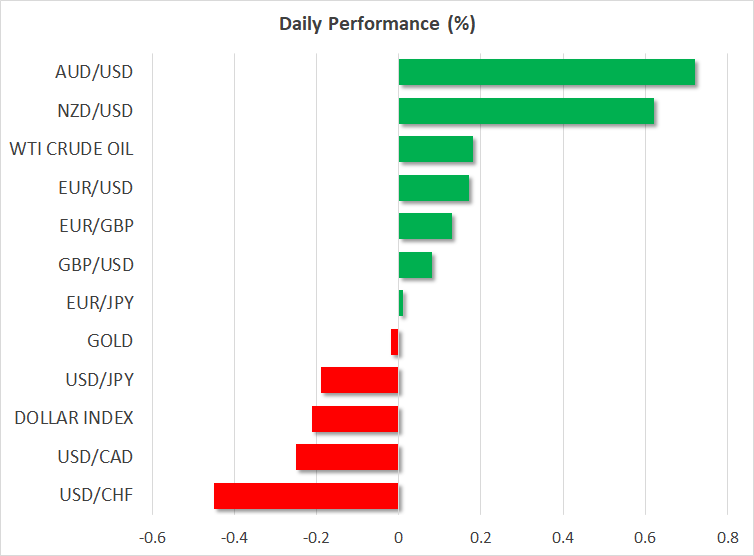- Dollar eases off as risk appetite makes a tepid return, US futures edge up
- Euro climbs despite Macron losing parliamentary majority
- Fed hawks downplay recession risks but investors cautious ahead of Powell
- Commodity prices remain pressured after sharp selloff

Panic selling pauses for now as yields pull back
Markets got off to a steadier start on Monday following last week’s turmoil that tipped the S&P 500 officially into a bear market. Fears about high inflation forcing central banks’ hands to hike rates aggressively and inadvertently triggering a global recession have hardly dissipated, but the pullback in yields in recent days might be supporting the cautious pickup in positive sentiment.
After the unexpected jump in US inflation in May, the Fed has gone ‘all in’ in its determination to combat spiralling prices. Barring the Bank of Japan, just about every other major central bank has pivoted towards the hawkish end of the scale, sparking worries that this universal resolve to get inflation under control will come at a huge economic cost.
Up until now, the associated boost in demand for safe havens had done little in softening the brutal selloff in government bonds. But that may be changing after the US 10-year Treasury yield hit 3.5%, which may potentially be the threshold that makes it attractive for investors to start owning bonds again. The ECB’s decision to devise a new tool to contain fragmentation in Eurozone bond markets has also helped yields to settle below last week’s multi-year highs.
Dollar slips but futures up during US holiday, Powell eyed
Lower yields combined with the improved mood are weighing on the US dollar today but lifting stock futures on Wall Street. The US market is closed on Monday for the Juneteenth bank holiday, so trading is likely to remain quiet for the rest of the day, but in the meantime European stocks have managed to open modestly higher.
Signs that the Biden administration is moving closer to repealing some of the Trump-era tariffs on Chinese imports as a means to lower some of the costs for American consumers is also supporting equities today. In China, meanwhile, shares were additionally bolstered by reports that the government is preparing new policies to support manufacturers struggling with high costs.
Whether this mild rebound in risk appetite can turn into a meaningful recovery for risk assets will likely depend on the flash PMI estimates for June due on Thursday as well as Fed Chair Jerome Powell’s first remarks following last week’s FOMC meeting when rates were hiked by 75 basis points.
Powell’s congressional hearing on Wednesday and Thursday will be closely watched by investors for clues as to whether the surprise 75-bps rate increase will be repeated next month.
Fed Governor Christopher Waller hinted on Saturday that he would back another jumbo hike, saying that recession fears seem “a bit overblown”.
Yen maintains downside bias, euro brushes aside Macron’s majority loss
The Bank of Japan’s decision on Friday not to abandon its yield curve control policy even as the upper limit of 0.25% on the 10-year yield was repeatedly tested sent the yen sinking. The Japanese currency extended its slide today against the commodity-linked aussie, kiwi and loonie, but it was slightly firmer against the US dollar.
The euro managed to reverse an earlier dip to climb back above $1.05 after coming under pressure from the preliminary results of the French legislative election.
President Macron’s Ensemble coalition is set to lose its absolute majority in France’s National Assembly, but investors are optimistic that the left-wing NUPES alliance won’t be able to gain power either as it was far-right leader Marine Le Pen's National Rally party that did surprisingly well. Macron will now probably have to make do with a minority government and try to pass legislation by working with the conservative Les Republicains party.
Oil and other commodities come under the firing line
Jitters about the growth outlook appear to have finally taken the steam out of the oil rally. US oil futures slumped by more than 9% last week and both WTI and Brent crude futures are struggling again today on concerns that weaker economic growth will significantly dampen demand despite the tight supply.
But it’s not just oil prices that have been plunging. Other commodities such as copper and iron ore have slid sharply too over the past week as headlines about a looming recession have dominated the news feeds.
Nevertheless, the Australian dollar and its kiwi counterpart were staging a solid rebound against the greenback on Monday.
